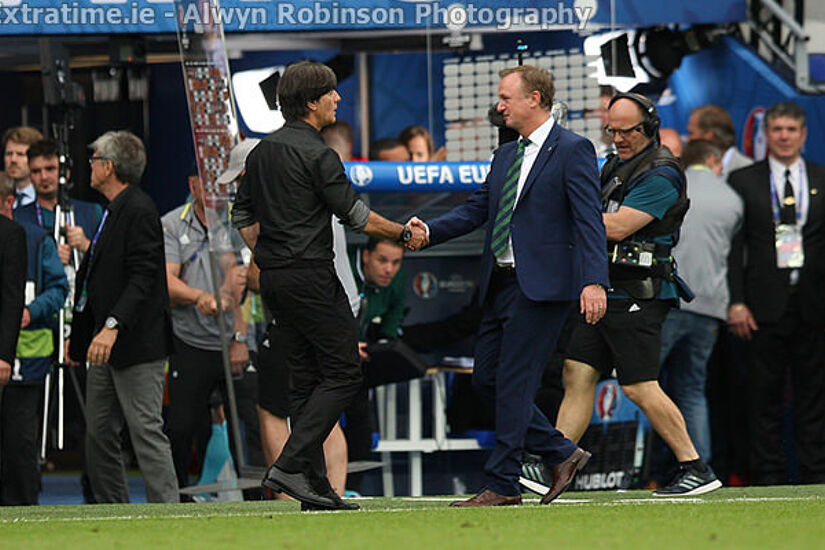Michael O'Neill: 'It was an enormous turnaround in three years at Rovers - maybe it wasn't fully appreciated'

Credit: Al Robinson (ETPhotos)
Michael O’Neill MBE is a title earned by the Northern Irishman for outstanding achievements as his country’s football manager.
Before that, Michael enjoyed huge success while Shamrock Rovers boss and has experienced a fulfilling playing career, as he recounts for ExtraTime.ie.
1985 saw a 15-year old O’Neill make his Irish League debut for his first senior club, Coleraine.
“I was in fourth year in school and remember Jim Platt telling me that I was going to play against Distillery,” O'Neill says.
“It was good to start so young and from 14, I didn’t play underage, but for the reserves.”
Two years later, the promising midfielder joined top-flight English side Newcastle United. His first season ended with 13 goals, contributing to a respectable eighth position, and he tasted international football, but the following year resulted in relegation, injuries and loss of form.
“I saw the two extremes of English football. Willie McFaul was sacked, Jim Smith came in and signed different types of players. I was injured, but wasn’t in his plans.
“He didn’t want to develop a young player and bought Micky Quinn and Mark McGhee. Everybody who’d brought me to Newcastle had moved and it was a different club to the one I’d signed for.”
From Tynecastle, the Armagh native joined Dundee United in 1989 for a club record fee, but a couple of seasons later relations soured with longstanding manager Jim McLean.
“I signed a three-year contract and intended to see it out. Jim wanted me to sign a new one, but there was no Bosman then and I felt that the club had a hold over me.
“The last year, I scored about five goals in the first six games and never played again. That’s the way Mr McLean operated.
“I was mistreated at a vital stage in my development, but those experiences shape you for the rest of your career.”
Three successful years at Hibernian under Alex Miller followed, until Michael almost ended up playing abroad, but declined to sign for Coventry City.
“1996 was the first year of the Bosman, which only allowed you to go to Europe then. I was close to going to Austrian side Sturm Graz.
“I went over, did the medical, agreed to the contract and in the meantime, Coventry had come in for me.
“They were in the Premier League and had negotiated a knock-down price because otherwise Hibs would get nothing if I went to Austria.
“I wish I’d taken the opportunity to play abroad, but the Premier League was where everybody wanted to go and I didn’t want to pass that up.”
1998-2002 witnessed O’Neill turn out for Wigan Athletic, St Johnstone, the Portland Timbers and Clydebank, preceding a return to Northern Ireland with Glentoran, who captured the 2002/03 Irish League, Irish League Cup and County Antrim Shield.
“There are four trophies to win in Northern Ireland. We prevailed in three and were beaten in the Irish Cup Final. It reconnected me with the Northern Irish game, which was important, given the position I’m in now.”
A brief spell with Ayr United preceded retirement, but then Michael cut his managerial teeth in 2006 at Brechin City, who released him towards the end of 2008 to become Shamrock Rovers manager.
Improving the Hoops dramatically during his initial season, O’Neill went one better in 2010, guiding them to a first Premier Division title in 16 years.
“A generation of fans hadn’t seen Rovers win the league before. It was great to witness, but so many people had done so much to keep the club afloat in their nomadic days.”
The next season, Tallaght’s finest retained the Premier Division and captured the Setanta Sports Cup, despite the distraction of becoming the first League of Ireland side to reach a European group stage.
“A lot of those Rovers players had little European experience and I, as a manager. It was also fabulous to maintain our league form against an excellent Sligo side.
“We played a lot of football and were the team to beat. The intensity at which we played in Europe was such a step up, but a great experience for everybody involved.”
After that memorable campaign, O’Neill left the club, unable to agree over Rovers’ direction.
“I got them to a good point and had spent virtually no money. I wanted a slight increase in the playing budget, but the board didn’t want that. It wasn’t amicable, but that’s football.
“Where Rovers came from in three years was an enormous turnaround, but maybe it wasn’t fully appreciated.”
Taking over as Northern Ireland boss soon after, Michael endured a poor start, but eventually led his country to Euro 2016, their first major tournament in 30 years.
“Northern Ireland had won about two games out of the previous 22 before I took over, so it wasn’t that we had a dip in form.
“People might have thought that the team weren’t progressing, but they were, despite the results. We needed belief and got that early on in the qualifying for France.”
In that competition, Northern Ireland lost 0-1 to Wales in the last 16.
“That game was cruel on us, but they have standout players. It’s no coincidence that Ramsey and Bale combined to put us out.
“We felt we’d another game in us and would’ve loved to have faced Belgium in the quarter-finals.”
Currently sitting a comfortable second place in 2018 World Cup Qualifying Group C, will O’Neill seek a fresh challenge, whether Northern Ireland qualify or not?
“Everybody tries to put me in a new job, but I’ll see how this campaign develops. We’re in a strong position to reach the play-offs, but still have to beat a tough team if we do.
“I’m not looking any further than that. It’s not a case of when your stock’s high, you have to move. Everybody keeps telling me that, but I’m not a great believer.”

